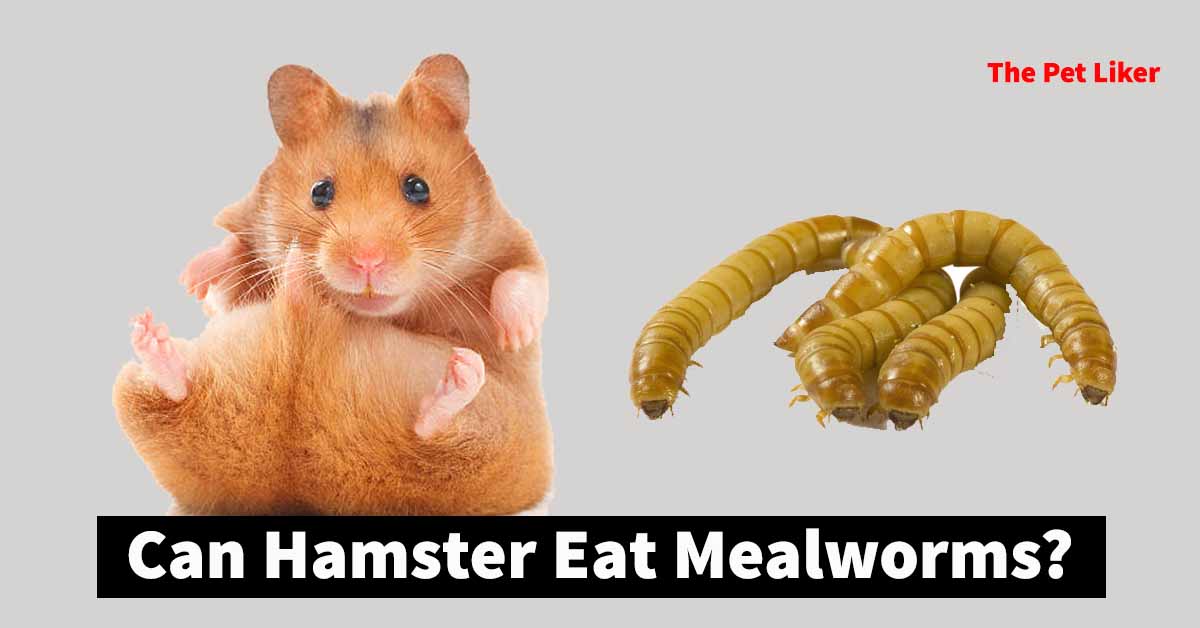Hamsters are beloved pets known for their playful and curious nature. As responsible pet owners, it’s essential to provide them with a well-balanced diet to ensure their health and happiness.
While hamsters typically thrive on a diet of fresh fruits, vegetables, and high-quality pellets, you may be wondering if they can eat mealworms.
These small, wiggly insects are a popular treat for other pets like reptiles and birds, but are they safe for hamsters to consume?
In this article, we’ll explore the benefits and risks of feeding mealworms to your furry friend and provide you with all the information you need to make an informed decision.
The Nutritional Value of Mealworms
Mealworms are an excellent source of protein, which is an essential nutrient for hamsters. Protein helps build and repair tissues, maintain a healthy immune system, and support the growth and development of muscles.
Mealworms are also rich in vitamins and minerals, such as vitamin B12, iron, and calcium, which are vital for maintaining strong bones, healthy blood, and proper metabolic function.
Mealworms contain healthy fats, such as omega-3 and omega-6 fatty acids, which can help improve the health of your hamster’s skin and coat. Overall, mealworms are a nutritious and healthy snack option for hamsters when fed in moderation.
Can Hamsters Eat Mealworms?
Yes, hamsters can eat mealworms, and they can be a healthy addition to their diet when given in moderation.
As mentioned earlier, mealworms are an excellent source of protein, vitamins, minerals, and healthy fats, which can provide your hamster with essential nutrients.
It’s crucial to note that mealworms should only be fed as a supplement to a balanced diet, and not as a replacement for it. It’s also important to ensure that the mealworms are fresh, clean, and free of any harmful pesticides or chemicals.
Lastly, be mindful of the quantity of mealworms you offer your hamster, as overfeeding can lead to digestive issues and obesity.
In summary, mealworms can be a safe and healthy treat for hamsters when fed in moderation and as part of a well-balanced diet.
Are Mealworms Safe For Hamsters?
Yes, mealworms are generally considered safe for hamsters to eat when given in moderation and under the right conditions. There are a few things to keep in mind to ensure your hamster’s safety.
Firstly, it’s crucial to ensure that the mealworms you offer your hamster are fresh, clean, and free from harmful pesticides or chemicals. You can purchase live or dried mealworms from pet stores or online retailers.
If you’re using live mealworms, make sure they are appropriate in size for your hamster and that they haven’t been exposed to any harmful substances.
Secondly, it’s essential to offer mealworms as a supplement to your hamster’s diet, not as a replacement for it. A well-balanced diet for hamsters should consist of fresh fruits, vegetables, and high-quality pellets.
Mealworms should be offered only as an occasional treat, and the quantity should be limited to prevent digestive issues and obesity.
Lastly, while mealworms are generally safe for hamsters, some hamsters may have allergies or sensitivities to them.
Benefits ✅
Feeding mealworms to hamsters can provide several benefits as long as they are offered in moderation and as part of a balanced diet. Here are some potential benefits of feeding mealworms to hamsters:
- Rich in protein: Mealworms are an excellent source of protein, which is essential for hamsters to maintain muscle, repair tissue, and support their immune system.
- Nutrient-dense: Mealworms are also a good source of vitamins and minerals, such as vitamin B12, iron, and calcium, which are crucial for maintaining strong bones, healthy blood, and proper metabolic function.
- Good source of healthy fats: Mealworms contain healthy fats, such as omega-3 and omega-6 fatty acids, which can help improve the health of your hamster’s skin and coat.
- Enrichment: Offering mealworms to your hamster can provide them with a fun and stimulating activity, which can help prevent boredom and promote mental stimulation.
- Training: Mealworms can also be used as a training aid, as they can be used to teach your hamster tricks or to encourage them to come to you on command.
Servings 🍽️
There are a few different ways to serve mealworms to your hamster. Here are some options:
- Dried mealworms: Dried mealworms are a popular option and can be purchased from pet stores or online retailers. They are easy to store, have a long shelf life, and are less messy than live mealworms. To serve, you can simply offer a small amount of dried mealworms in a dish or sprinkle them on top of your hamster’s food.
- Live mealworms: Live mealworms can be a fun and interactive treat for your hamster. They can be purchased from pet stores or online retailers and should be kept in a container with some food, such as oatmeal or bran, to keep them alive. To serve, you can offer a few live mealworms in a dish or let your hamster hunt for them in their enclosure.
- Homemade treats: You can also make homemade treats using mealworms. For example, you can mix cooked rice or oatmeal with mashed sweet potato and a few mealworms to make a tasty and nutritious snack for your hamster.
Wrapping Up
Hope this article answered your question “Can hamsters eat mealworms?”
Mealworms can be a safe and healthy treat for hamsters when offered in moderation and as part of a balanced diet.
They are an excellent source of protein, vitamins, minerals, and healthy fats, which can provide your hamster with essential nutrients.
It’s crucial to ensure that the mealworms are fresh, clean, and free of harmful pesticides or chemicals and that they are offered as a supplement to your hamster’s regular diet, not as a replacement for it.
Be sure to monitor your hamster’s reaction to mealworms and consult with a veterinarian if you have any concerns.
By following these guidelines, you can safely offer mealworms to your hamster as a tasty and nutritious treat.
Thank you for reading! Always stay with The pet liker!! Have a nice day!!!
FAQS
Here are some frequently asked questions about feeding mealworms to hamsters:
How many mealworms should I feed my hamster?
- You should only feed mealworms to your hamster in moderation, and the quantity should depend on your hamster’s size and nutritional needs. As a general rule, you can offer one or two mealworms per day as a treat, or a few more as part of a balanced diet.
Can I feed my hamster mealworms every day?
- No, you should not feed your hamster mealworms every day, as this can lead to digestive issues and obesity. Mealworms should be offered only as an occasional treat, and as part of a well-balanced diet.
Are there any risks associated with feeding mealworms to hamsters?
- As long as the mealworms are fresh, clean, and offered in moderation, there are typically no significant risks associated with feeding mealworms to hamsters. However, some hamsters may have allergies or sensitivities to mealworms, so it’s essential to monitor your hamster’s reaction and consult with a veterinarian if you have any concerns.
Can I offer my hamster other types of insects?
- Yes, there are other types of insects that hamsters can eat, such as crickets, grasshoppers, and waxworms. However, you should ensure that they are safe for your hamster to eat and offer them in moderation as part of a balanced diet.
Can mealworms replace my hamster’s regular food?
- No, mealworms should not replace your hamster’s regular food, as they do not provide all the necessary nutrients that your hamster needs to stay healthy. Mealworms should only be offered as a supplement to your hamster’s regular diet and in moderation.

